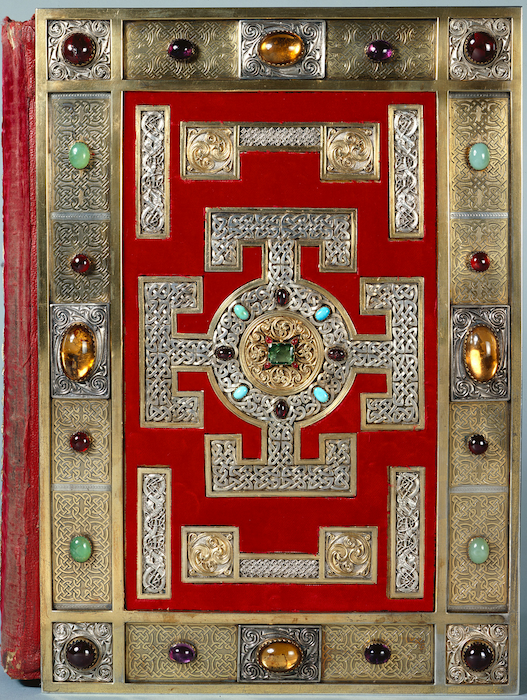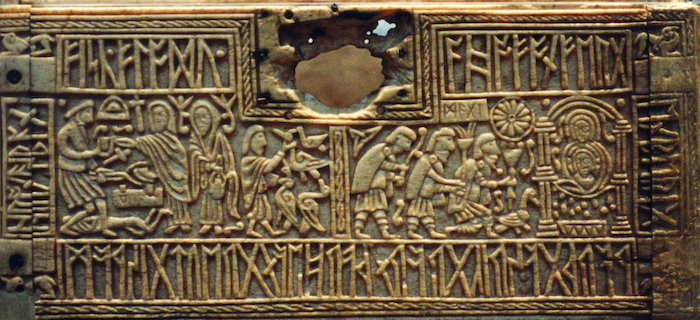Conditor, aeternis fulcit qui saecla columnis,
Rector regnorum, frenans et fulmina lege,
Pendula dum patuli vertuntur culmina caeli,
Me varium fecit, primo dum conderet orbem.
5 Pervigil excubiis: numquam dormire iuvabit,
Sed tamen extemplo clauduntur lumina somno;
Nam Deus ut propria mundum dicione gubernat,
Sic ego complector sub caeli cardine cuncta.
Segnior est nullus, quoniam me larbula terret,
10 Setigero rursus constans audacior apro;
Nullus me superat cupiens vexilla triumphi
Ni Deus, aethrali summus qui regnat in arce.
Prorsus odorato ture flagrantior halans
Olfactum ambrosiae, necnon crescentia glebae
15 Lilia purpureis possum conexa rosetis
Vincere spirantis nardi dulcedine plena;
Nunc olida caeni squalentis sorde putresco.
Omnia, quaeque polo sunt subter et axe reguntur,
Dum pater arcitenens concessit, jure guberno;
20 Grossas et graciles rerum comprenso figuras.
Altior, en, caelo rimor secreta Tonantis
Et tamen inferior terris tetra Tartara cerno;
Nam senior mundo praecessi tempora prisca,
Ecce, tamen matris horno generabar ab alvo
25 Pulchrior auratis, dum fulget fibula, bullis,
Horridior ramnis et spretis vilior algis.
Latior, en, patulis terrarum finibus exto
Et tamen in media concludor parte pugilli,
Frigidior brumis necnon candente pruina,
30 Cum sim Vulcani flammis torrentibus ardens,
Dulcior in palato quam lenti nectaris haustus
Dirior et rursus quam glauca absinthia campi.
Mando dapes mordax lurconum more Ciclopum,
Cum possim iugiter sine victu vivere felix.
35 Plus pernix aquilis, Zephiri velocior alis,
Necnon accipitre properantior, et tamen horrens
Lumbricus et limax et tarda testudo palustris
Atque, fimi soboles sordentis, cantarus ater
Me dicto citius vincunt certamine cursus.
40 Sum gravior plumbo: scopulorum pondera vergo;
Sum levior pluma, cedit cui tippula limphae;
Nam silici, densas quae fudit viscere flammas,
Durior aut ferro, tostis sed mollior extis.
Cincinnos capitis nam gesto cacumine nullos,
45 Ornent qui frontem pompis et tempora setis,
Cum mihi caesaries volitent de vertice crispae,
Plus calamistratis se comunt quae calamistro.
Pinguior, en, multo scrofarum axungia glesco,
Glandiferis iterum referunt dum corpora fagis
50 Atque saginata laetantur carne subulci;
Sed me dira famis macie torquebit egenam,
Pallida dum iugiter dapibus spoliabor opimis.
Limpida sum, fateor, Titanis clarior orbe,
Candidior nivibus, dum ningit vellera nimbus,
55 Carceris et multo tenebris obscurior atris
Atque latebrosis, ambit quas Tartarus, umbris.
Ut globus astrorum plasmor teres atque rotunda
Sperula seu pilae necnon et forma cristalli;
Et versa vice protendor ceu Serica pensa
60 In gracilem porrecta panum seu stamina pepli.
Senis, ecce, plagis, latus qua panditur orbis,
Ulterior multo tendor, mirabile fatu;
Infra me suprave nihil per saecula constat
Ni rerum genitor mundum sermone coercens.
65 Grandior in glaucis ballena fluctibus atra
Et minor exiguo, sulcat qui corpora, verme
Aut modico, Phoebi radiis qui vibrat, atomo;
Centenis pedibus gradior per gramina ruris
Et penitus numquam per terram pergo pedester.
70 Sic mea prudentes superat sapientia sofos,
Nec tamen in biblis docuit me littera dives
Aut umquam quivi, quid constet sillaba, nosse.
Siccior aestivo torrentis caumate solis,
Rore madens iterum plus uda flumine fontis;
75 Salsior et multo tumidi quam marmora ponti
Et gelidis terrae limphis insulsior erro,
Multiplici specie cunctorum compta colorum,
Ex quibus ornatur praesentis machina mundi,
Lurida cum toto nunc sim fraudata colore.
80 Auscultate mei credentes famina verbi,
Pandere quae poterit gnarus vix ore magister
Et tamen infitians non retur frivola lector!
Sciscitor inflatos, fungar quo nomine, sofos.
EXPLICIUNT ENIGMATA.




Commentary for Exeter Riddle 94
MEGANCAVELL
Date: Wed 09 Jun 2021Matching Riddle: Exeter Riddle 94
Riddle 94’s commentary is also by Erin Sebo, senior lecturer in English at Flinders University in Australia. Take it away, Erin!
Riddle 94 is one of the most fragmented riddles in the Exeter Book. It is often ignored and even left out of translations, such as in Kevin Crossley-Holland’s excellent translation. Just enough survives for it to be identified as a creation riddle, a version of the same idea found in Riddles 40 and 66. Which seems to make it even less interesting: why waste time on a few disconnected words when we have two complete versions of the riddle already as well as Aldhelm’s original Latin version?!
But, actually, the fact we have something to compare this riddle to – an absolute luxury in Old English literature – means that it is possible to learn things that we can’t with texts that survive in one version (or one manuscript!). In this case – as I argued in my book – because we have different versions of the same text, we can see a range of different popular cosmological and astronomical ideas, and possibly even get a hint of how these ideas changed over time.
Photo of stars rotating (by Jordan Condon) from Wikimedia Commons (licence: CC BY 3.0).
Riddle 94 draws on much of the imagery of Riddles 40 and 66 and is also based around a series of comparatives, but the form is simplified, perhaps suggesting it was composed later or had circulated in popular culture. Often we have lost what is being compared but we can still tell the order of these images – and that’s revealing. For example, the riddles doesn’t begin with the large celestial comparatives “higher than heaven” and “brighter than the sun.” Both are demoted to after whatever thing was designated “smoother.” It’s an odd choice. The other creation riddles start with the celestial…and what could the universe be smeþr (smoother) than that could be theologically and cosmologically important enough to earn it a place above the heavens and the sun? There is no other instance of smeðe in its comparative form in the Old English corpus so the comparison was not common. Obviously, this riddle was doing something new.
The seven surviving adjectives in Riddle 94 are: smeþr (smoother), hyrre (higher), glædre (brighter), smeare (sharper), leofre (dearer) and leohtre (lighter). Since these are virtually all we have to go on, it’s worth looking at how they’re used elsewhere. The first, smoother is not found in Riddles 40 or 66, but Aldhelm and Symphosius use a Latin equivalent, teres (smooth), for the stars – in Aldhelm’s Enigma 100, De Creatura (line 57) and the horn casing of a lantern in Symphosius’s Enigma 67, Lanterna (line 1), respectively. The next adjective, higher, in very common and usually contrasts heaven or heavenly things with infernal depths. Brighter, the next, refers to the sun. It seems the obvious adjective to moderns but actually the sun is usually described as swift in Old English poetry. (Riddle 66 describes the moon as brighter!)
Sun vs Moon in a late 15th-century calendar by Johannes von Gmunden from Wikimedia Commons (public domain).
Smeare, especially in the metaphorical sense in which it applies to salt, is absent from earlier creation riddles, though Aldhelm makes saltiness a comparative in its own right. Leofre is equally absent from Riddle 94’s antecedents and it is the first instance of a “subjective” quality: something may only be dear if it is dear to someone. Leohtre, the last, is more fraught since we can’t be sure if it’s used in the sense of “brighter” or “less weighty.”
These last two form the most complete line of the fragment: “dearer than all this light, lighter than…” Unlike the other Creation riddles which have dualistic parings, this seems to be associative – for a sense of how unusual this is, it’s worth comparing it with “religious” cosmological descriptions. The most influential of these is the creation of the world in the Book of Genesis which works through a hierarchy of oppositions, starting with the division of earth and heaven, then light, then sky from sea, then sea from land. This basic structure is echoed elsewhere, such as this description of God’s power in Homily 5 of the Vercelli Book: his miht is ufor þonne heofon & bradre þonne eorðe & deopre þonne sæ & leohtre þonne heofones tungel (Scragg, page 121, line 194) (…His might is higher than heaven, and broader than the earth, and deeper than the sea and lighter than Heaven’s star).
This is a version of the “creation comparatives,” which conforms to the Christian structure and order of the images in Genesis. God makes Heaven (ufor þonne heofon), then separates the land (bradre þonne eorðe) from the sea (deopre þonne sæ) and then sets the celestial bodies on their trajectory (leohtre þonne heofones tungel).
Although this riddle in its fragmented state is easy to ignore, it survived long after most of the Exeter Book riddles were forgotten (except by scholars). Unlike most of the Exeter riddles, Riddle 94 is the first which is not characterized by word pictures, instead favouring a stable structure into which any number of formulaic elements may be fitted. This makes it far better suited to popular riddle-telling (as opposed to riddle reading) than most in the Exeter Book. And that’s what happened. The question implicit in Riddle 94’s statement that Creation is “higher than heaven” becomes overt in a 1430 lyric “Inter Diabolus et Virgo”* (Rawlinson MS. D. 328, folio 174b): “What ys hyer than ys…?” Each adjective is turned into its own question and new adjectives are added. The lyric survives as a ballad into the 19th century, when it was collected by the folklorist Francis James Child who made it the first ballad in his monumental collection, The English and Scottish Popular Ballads, under the title “Riddles Wisely Expounded”. Anything set to music tends to survive and you can even find the very last traces of “Riddles Wisely Expounded” in Tom Waits’ 2006 recording of “Two sisters” on Orphans: brawlers, bawlers and bastards (Sebo, page. 136). Go have a listen!
*Don’t @ me, I know what case inter takes.
References and Suggested Reading:
Crossley-Holland, Kevin, trans. The Exeter Book Riddles. London: Enitharmon, 2008.
Scragg, D. G., ed. The Vercelli Homilies and Related Texts. Early English Text Society 300. Oxford: Oxford University Press, 1992.
Sebo, Erin. In Enigmate: The History of a Riddle, 400–1500. Dublin: Four Courts Press, 2018.
Tags: anglo saxon exeter book riddles old english solutions erin sebo riddle 94
Related Posts:
Commentary for Exeter Riddle 40
Commentary for Exeter Riddle 66
Exeter Riddle 40
Exeter Riddle 66
Exeter Riddle 94